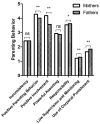The Father's Part: Influences of Paternal Psychopathology and Parenting Behavior on Child and Adolescent Well-Being
- PMID: 37570360
- PMCID: PMC10418667
- DOI: 10.3390/healthcare11152119
The Father's Part: Influences of Paternal Psychopathology and Parenting Behavior on Child and Adolescent Well-Being
Abstract
Family influences on child quality of life (QoL) are increasingly understood. Parenting behavior and parent individual psychopathology are among the established predictors of offspring mental health. However, literature often addresses these factors as 'parental', lacking further gender-specific differentiation while predominantly studying maternal aspects. Social and biological fathers are still underrepresented in family research. The aim of this study was to analyze paternal contributions to child well-being. A total of 197 father/mother-dyads gave a standardized self-report on parenting behavior and their own psychopathology at child primary school age (t1; 6-10 y). Ratings were compared mutually and associated with child self-rated QoL at t1 and adolescence (t2; 12-14 y). Fathers and mothers differed in psychopathology and most parenting behavior dimensions (positive parenting, involvement, responsible parenting, poor monitoring, and corporal punishment). Father psychopathology made a relevant predictive contribution to girls' QoL at t2. Boys' t1 QoL was significantly influenced by maternal parenting factors (positivity and corporal punishment). Compared to mothers, fathers are faced with different individual stressors; paternal parenting behavior is different, while fathers' influences are significant, particularly for daughters. Father-addressed pre- and intervention programs in child psychotherapeutic treatment are of high relevance.
Keywords: child development; father; parent-child-relations; parental influence; parenting; parenting behavior; resilience.
Conflict of interest statement
The authors declare no conflict of interest.
Figures



References
-
- Otto C., Haller A.C., Klasen F., Hölling H., Bullinger M., Ravens-Sieberer U., BELLAStudy, Group Risk and protective factors of health-related quality of life in children and adolescents: Results of the longitudinal BELLA study. PLoS ONE. 2017;12:e0190363. doi: 10.1371/journal.pone.0190363. - DOI - PMC - PubMed
-
- Plass A., Haller A.-C., Habermann K., Barkmann C., Petermann F., Schipper M., Wiegand-Grefe S., Hölling H., Ravens-Sieberer U., Klasen F. Factors promoting mental health in children of parents with mental health problems: Results of the BELLA cohort study. Kindh. Und Entwickl. 2016;25:41–49. doi: 10.1026/0942-5403/a000187. - DOI
-
- Panter-Brick C., Burgess A., Eggerman M., McAllister F., Pruett K., Leckman J.F. Practitioner review: Engaging fathers—Recommendations for a game change in parenting interventions based on a systematic review of the global evidence. J. Child. Psychol. Psychiatry. 2014;55:1187–1212. doi: 10.1111/jcpp.12280. - DOI - PMC - PubMed
Grants and funding
LinkOut - more resources
Full Text Sources

